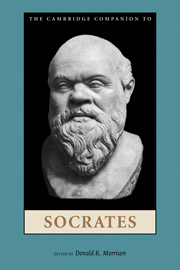Book contents
- Frontmatter
- 1 The Rise and Fall of the Socratic Problem
- 2 The Students of Socrates
- 3 Xenophon and the Enviable Life of Socrates
- 4 Socrates in Aristophanes’ Clouds
- 5 Socrates and the New Learning
- 6 Socratic Religion
- 7 Socrates and Democratic Athens
- 8 Socratic Method
- 9 Self-Examination
- 10 Socratic Ignorance
- 11 Reconsidering Socratic Irony
- 12 Socratic Ethics and the Socratic Psychology of Action
- 13 Socrates and Eudaimonia
- 14 Socrates’ Political Philosophy
- 15 Socrates in Later Greek Philosophy
- Socrates Bibliography
- Index of Names and Subjects
- Index of Passages
15 - Socrates in Later Greek Philosophy
Published online by Cambridge University Press: 28 March 2011
- Frontmatter
- 1 The Rise and Fall of the Socratic Problem
- 2 The Students of Socrates
- 3 Xenophon and the Enviable Life of Socrates
- 4 Socrates in Aristophanes’ Clouds
- 5 Socrates and the New Learning
- 6 Socratic Religion
- 7 Socrates and Democratic Athens
- 8 Socratic Method
- 9 Self-Examination
- 10 Socratic Ignorance
- 11 Reconsidering Socratic Irony
- 12 Socratic Ethics and the Socratic Psychology of Action
- 13 Socrates and Eudaimonia
- 14 Socrates’ Political Philosophy
- 15 Socrates in Later Greek Philosophy
- Socrates Bibliography
- Index of Names and Subjects
- Index of Passages
Summary
introduction
Socrates is a philosopher whose world historical importance and renown are largely due to three remarkable facts. First, his life and especially his trial and death, though cardinal to his posthumous influence and standing, were relatively minor events for the majority of his contemporary Athenians and their immediate descendants. During the first years after his death, he was still the controversial figure he had been throughout his later life. He had written nothing, and it was just a few of his companions, Plato, Antisthenes, Xenophon, and the other Socratic authors, whose writings in his defense and teachings began, though only gradually, to turn this eccentric and disturbing Athenian into an intellectual and moral icon. He had hardly achieved that status even fifty years after his execution; for he is mentioned in only one context by Isocrates (Busiris 4.3; 5.9), but once by the orator Aeschines (Against Timarchus 173), and never by Demosthenes.
Socrates, then – and this is the second salient fact – owes his philosophical significance to the diverse ways he was interpreted, lauded, and sometimes even criticized by authors who, thanks to their own intellectual and educational creativity, made Greek philosophy the major cultural presence it had not yet become during his own lifetime. With the founding of official schools of philosophy – the Academy, the Lyceum, the Garden of Epicurus, the Zenonian Stoa – and with less formally organized philosophical movements, especially the Cynics, contexts emerged for Socrates to return to live a life far more wide-reaching and various than anything he could have imagined for himself. Because each school or movement had its own quite distinct identity, their interpretations of Socrates followed suit.
- Type
- Chapter
- Information
- The Cambridge Companion to Socrates , pp. 355 - 380Publisher: Cambridge University PressPrint publication year: 2010
- 3
- Cited by

